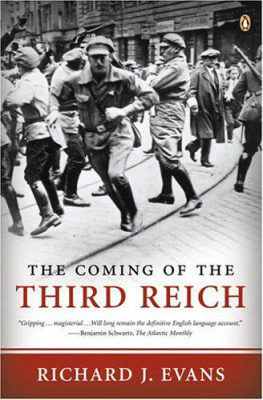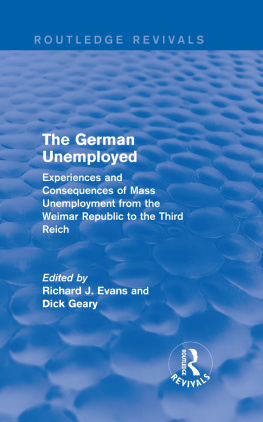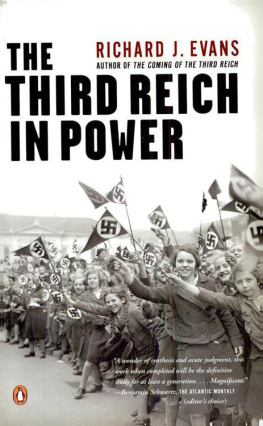Richard J. Evans - Rethinking German History: Nineteenth-Century Germany and the Origins of the Third Reich
Here you can read online Richard J. Evans - Rethinking German History: Nineteenth-Century Germany and the Origins of the Third Reich full text of the book (entire story) in english for free. Download pdf and epub, get meaning, cover and reviews about this ebook. year: 2015, publisher: Taylor and Francis, genre: Politics. Description of the work, (preface) as well as reviews are available. Best literature library LitArk.com created for fans of good reading and offers a wide selection of genres:
Romance novel
Science fiction
Adventure
Detective
Science
History
Home and family
Prose
Art
Politics
Computer
Non-fiction
Religion
Business
Children
Humor
Choose a favorite category and find really read worthwhile books. Enjoy immersion in the world of imagination, feel the emotions of the characters or learn something new for yourself, make an fascinating discovery.
- Book:Rethinking German History: Nineteenth-Century Germany and the Origins of the Third Reich
- Author:
- Publisher:Taylor and Francis
- Genre:
- Year:2015
- Rating:4 / 5
- Favourites:Add to favourites
- Your mark:
- 80
- 1
- 2
- 3
- 4
- 5
Rethinking German History: Nineteenth-Century Germany and the Origins of the Third Reich: summary, description and annotation
We offer to read an annotation, description, summary or preface (depends on what the author of the book "Rethinking German History: Nineteenth-Century Germany and the Origins of the Third Reich" wrote himself). If you haven't found the necessary information about the book — write in the comments, we will try to find it.
Richard J. Evans: author's other books
Who wrote Rethinking German History: Nineteenth-Century Germany and the Origins of the Third Reich? Find out the surname, the name of the author of the book and a list of all author's works by series.
Rethinking German History: Nineteenth-Century Germany and the Origins of the Third Reich — read online for free the complete book (whole text) full work
Below is the text of the book, divided by pages. System saving the place of the last page read, allows you to conveniently read the book "Rethinking German History: Nineteenth-Century Germany and the Origins of the Third Reich" online for free, without having to search again every time where you left off. Put a bookmark, and you can go to the page where you finished reading at any time.
Font size:
Interval:
Bookmark:

Routledge Revivals
In Rethinking German History, first published in 1987, Richard J. Evans argues for a social-historical approach to the German past that pays equal attention to objective social structures and subjective values and experiences. If German history has been seen as an exception to the normal development of Western society, this is not least because historians have until recently largely failed to look beyond the world of high politics, institutions, organizations and ideologies to broader historical problems of German society and German mentalities. By applying and adapting approaches learned from French and British social history as they have been developed over the last quarter of a century, it is possible to achieve a rethinking of German history which does away with many of the textbook myths that have encrusted the historiography of Germany for so long.
This book will be valuable for students of German history and politics, and brings together essays widely used in teaching. Its broad coverage of social history will also be useful to all those interested in contemporary historiography or the comparative study of European history.
Rethinking German History
Nineteenth-Century Germany and the
Origins of the Third Reich
Richard J. Evans

First published in 1987
by Unwin Hyman Ltd
This edition first published in 2015 by Routledge
2 Park Square, Milton Park, Abingdon, Oxon, OX14 4RN
and by Routledge
711 Third Avenue, New York, NY 10017
Routledge is an imprint of the Taylor & Francis Group, an informa business
1987 Richard J. Evans
The right of Richard J. Evans to be identified as author of this work has been asserted by him in accordance with sections 77 and 78 of the Copyright, Designs and Patents Act 1988.
All rights reserved. No part of this book may be reprinted or reproduced or utilised in any form or by any electronic, mechanical, or other means, now known or hereafter invented, including photocopying and recording, or in any information storage or retrieval system, without permission in writing from the publishers.
Publishers Note
The publisher has gone to great lengths to ensure the quality of this reprint but points out that some imperfections in the original copies may be apparent.
Disclaimer
The publisher has made every effort to trace copyright holders and welcomes correspondence from those they have been unable to contact.
A Library of Congress record exists under LC control number: 87000975
ISBN 13: 978-1-138-84284-7 (hbk)
ISBN 13: 978-1-315-72734-9 (ebk)
RETHINKING GERMAN
HISTORY
Nineteenth-Century Germany
and the Origins of the
Third Reich
RICHARD J. EVANS
London
UNWIN HYMAN
Boston Sydney Wellington
Richard Evans, 1987
This book is copyright under the Berne Convention. No
reproduction without permission. All rights reserved.
Puhlishe by the: Academic Division of
Unwin Hyman Ltd
15/17 Broadwick Street, London W1V 1FP, UK
Unwin Hyman Inc.,
8 Winchester Place, Winchester, Mass. 01890, USA
Allen & Unwin (AuStralia) Ltd.
8 Napier Street, North Sydney, NSW 2060, AuStralia
Allen & Unwin (New Zealand) Ltd in association with the
Port Nicholson Press Ltd,
Compusales Building. 75 Ghuznee Street. Wellington 1, New Zealand
First published in 1987
First published in paperback in 1990
British Library Cataloguing in Publication Data
Evans, Richard J.
Rethinking German history : Nineteenth-Century Germany and the Origins of the Third Reich.
1. Germany Social life and customs Historiography
I. Title
943.07072 DD204
ISBN 0049430513
0044457200 Pbk
Library of Congress Cataloging-in-Publication Data
Evans, Richard J.
Rethinking German history.
Essays, most of which were published in various journals between 1978 and 1985.
Includes index.
1. Germany History 17891900. 2. Germany History 20th century. I. Title.
DD204.E88 1987 943.07 87975
ISBN 0049430513 (alk. paper)
0044457200 Pbk
Typeset in 10/12 Garamond by Computape
and printed in Great Britain
by Biddles Ltd, Guildford
For the students in my
graduate and undergraduate seminars
in German history,
Columbia University, New York, 1980,
and
University of East Anglia, Norwich, 197686
Of the contents of this collection, the Introduction has been specially written, and is previously unpublished. Of the rest, the original places of publication were as follows:
: Richard J. Evans (ed.), Society and Politics in Wilhelmine Germany (London: Croom Helm, 1978), pp. 1139; and West European Politics, vol. 4, no. 2 (1981), pp. 13448 (London: Frank Cass and Co.).
: Historical Journal, vol. 26, no. 2 (1983), pp. 48597, and vol. 26, no. 4 (1983), pp. 9991020 (Cambridge University Press); History, vol. 68 (1983), pp. 3645.
: New Left Review, vol. 149 (Jan./Feb. 1985), pp. 6794.
: European Studies Review, vol. 12, no. 3 (1982), pp. 24988 (SAGE Publications Ltd).
: Richard J. Evans (ed.), The German Working Class 18881933: The Politics of Everyday Life (London: Croom Helm, 1982), pp. 1553.
: Richard J. Evans (ed.), Society and Politics in Wilhelmine Germany (London, Croom Helm, 1978), pp. 186214.
: Social History, vol. 4, no. 1 (1979), pp. 131 (Methuen and Co. Ltd).
Most general books on German history consist of straightforward narratives of political events, with a strong emphasis on German unification, the origins of the First World War, the rise and fall of Nazism and the emergence of the two Germanies after 1945. Within the narrative framework they tend to concentrate on presenting the factors that led to the catastrophe of Hitlers Third Reich. In this book, I want to argue that social history, the history of German society as a whole, and not just its thin upper crust, cannot be relegated to a few statistical tables in an appendix, or confined to the illustration of a handful of literary texts. Social history belongs in the centre of German history, and it is when we put it there that the rethinking process really begins.
The essays collected in this book seek to illustrate and exemplify this basic argument in a number of ways. The M of the book presents three studies which concentrate on challenges to authority in Imperial Germany the Social Democratic Party, the feminist movement, and popular disturbances. Here the intention is to question the stereotype of the orderly German, and to suggest that the Kaiserreicb was not a rigid, immobile, hierarchical society yearning for authority, but a society in an active state of ferment and flux. It was out of such social upheaval, seen in a general sense, and not out of social stagnation, that Nazism was eventually born.
Because they form a collective argument in favour of social history, the essays published (or republished) in this book inevitably have a strongly historiographical slant. They can be seen as assessments of the contributions made by a number of different approaches to our understanding of the German past, ranging from biographical and organizational history (). It therefore provides an introduction to recent German and Anglo-American work in these fields, and conveys to an English-reading audience, accustomed to thinking of European social history mainly in terms of Britain and France, something of the rich variety of socio-historical work now being done on Germany.
Font size:
Interval:
Bookmark:
Similar books «Rethinking German History: Nineteenth-Century Germany and the Origins of the Third Reich»
Look at similar books to Rethinking German History: Nineteenth-Century Germany and the Origins of the Third Reich. We have selected literature similar in name and meaning in the hope of providing readers with more options to find new, interesting, not yet read works.
Discussion, reviews of the book Rethinking German History: Nineteenth-Century Germany and the Origins of the Third Reich and just readers' own opinions. Leave your comments, write what you think about the work, its meaning or the main characters. Specify what exactly you liked and what you didn't like, and why you think so.











